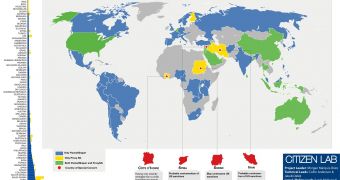There’s a lot of controversy around the sale of web surveillance devices to governments that are known for violating fundamental human rights. University of Toronto’s Citizen Lab has released a new report which reveals that monitoring devices marketed by California-based Blue Coat Systems are used in such countries.
According to Citizen Lab, Blue Coat devices – such as ProxySG and PacketShape – have been found on the public networks of 83 countries, including ones that are subject to US Sanctions, such as Iran, Syria and Sudan.
“It appears that the presence of these devices are in contravention of sanctions provisions, raising questions regarding Blue Coat Systems’ compliance measures, and the ease of access by authoritarian regimes to Western-made dual-use technologies despite extensive US sanctions regimes,” the report reads.
In Iran, for instance, six active devices have been spotted on the networks of Internet service provider (ISP) Max Net, and on the networks of the Information Technology Company, which is managed by the country’s Ministry of Communications and Information Technology.
In Sudan, a web-monitoring device has been discovered on the networks of the Canar Telecom ISP. In Syria, devices have been identified on the networks of state-owned Syrian Telecommunications Establishment.
In addition, Blue Coat products have also been spotted in countries that are subject to more limited US sanctions, such as Côte d’Ivoire, Iraq, Lebanon, Liberia, and Zimbabwe.
Experts highlight the fact that Blue Coat Systems must comply with the sanctions, considering that it’s a US company.
Citizen Labs has inquired Blue Coat and its major investor, the Ontario Teachers’ Pension Plan (OTPP), about their practices. So far, there hasn’t been a response from the companies, but Citizen Lab promises to publish their reply in full.
The complete “Some Devices Wander By Mistake: Planet Blue Coat Redux,” report is available here.

 14 DAY TRIAL //
14 DAY TRIAL //